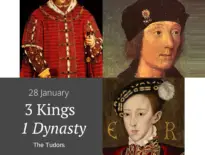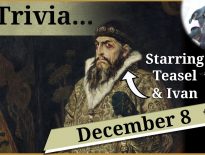Henry VIII wasn’t just a king, he was also a composer. One of his beautiful creations, the carol “Green Groweth the Holly,” has sparked centuries of debate.
Was this lyrical masterpiece a heartfelt love song for his first wife, Catherine of Aragon? Or was it simply an exercise in courtly love and poetry?
In this post, I delve into the fascinating lyrics, the rich symbolism of holly and ivy, and the context in which it was written. Was it composed during the early days of their passionate romance? Or does its timing suggest it might not have been about Catherine at all?
Green groweth the holly
So doth the ivy.
Though winter blasts blow never so high,
Green groweth the holly.As the holly groweth green
And never changeth hue,
So I am, ever hath been,
Unto my lady true.As the holly groweth green
With ivy all alone
When flowers cannot be seen
And greenwood leaves be gone.Now unto my lady,
Promise to her I make,
From all other only
To her I me betake.Adieu, mine own lady,
Adieu, my special
Who hath my heart truly
Be sure, and ever shall.
Isn’t it beautiful? It’s one of many songs composed by Henry VIII, including his hit “Pastime with Good Company”, which was popular across Europe.
Holly and ivy are familiar plants in the English landscape and, of course, today, are linked to Christmas, and they would have been the sorts of plants that Tudor people would have decorated their homes with during the 12 days of Christmas. There’s a lot of symbolism associated with them too. Holly is traditionally associated with protection and good fortune, while ivy symbolises fidelity and undying love. They also have religious significance, with the holly representing Christ, his crown of thorns and the berries his blood, and the ivy representing his mother, the Virgin Mary.
But back to “Green Groweth the Holly”, which is definitely more of a love song—was it written for Catherine of Aragon? Was she the lady he promised to stay true to, the lady who has his whole heart?
Well… that’s where things get tricky.
It was published in 1522, when Henry was still married to Catherine. But by then, their relationship was strained. Her last pregnancy had ended in tragedy in 1518, and the king was probably feeling disillusioned.
It’s possible the song was written earlier, back when Henry was madly in love with Catherine, playing the chivalrous knight in shining armour. After all, he did once dress up as Robin Hood to surprise her!
But… could it have been written for someone else? A mistress? Or was it simply a song inspired by the courtly love tradition, with no real woman in mind?
It’s hard to say.
Personally, I’d like to think it was about Catherine, written when Henry was still that romantic young king. But with Henry VIII, anything is possible—he was complex and unpredictable!



Leave a Reply